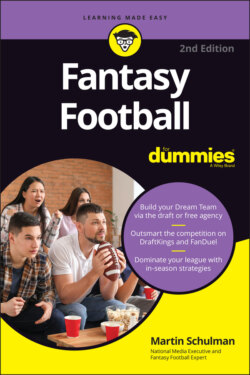Читать книгу Fantasy Football For Dummies - Martin A. Schulman - Страница 69
Handling trade protests
ОглавлениеIt seems as though just about every fantasy football trade is met with cries of “unfair!” A league commissioner can’t prevent that all-too-human reaction, but they can try to control it by outlining criteria that must be met for a trade to be vetoed or reversed. Always stay objective and try to determine if the trade is lopsided or contains damaged goods:
Lopsided refers to a trade where one team gets great value for giving up little value — an unbalanced equation, in other words (such as sending a RB1 for a backup RB3). However, some trades may look sketchy on paper and thus cause a ruckus in your league but end up being fair or actually favoring the manager supposedly being fleeced. For that reason, you should keep the standards for vetoing a trade high.
Damaged goods refers to players who may or may not be injured. Any deal involving an injured player should be subject to a commissioner’s review. If a coach who’s set to receive the damaged goods is unaware of the serious injury, or if an injury that could affect the long-term status of a player occurs during the review period, the commish should veto it. This action prevents coaches from knowingly or unknowingly dealing players who won’t be available for extended periods of time. Of course, if managers make a deal for a player who’s injured, and the manager acquiring that player is well aware of the situation and wants to take the risk, you should allow it.
At the end of the day, if the coaches in your league believe that you’re making decisions in an unbiased fashion, they’ll accept your determinations even when they’re on the losing side of your calls.
